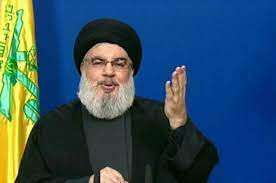Nasrallah, attacks the Gulf and does not oppose dialog with it

Hassan Nasrallah, the secretary-general of the Lebanese Hezbollah movement, on Tuesday described as “dictates” the Gulf proposals Lebanon’s foreign minister conveyed to Gulf States to mend relations, but said that “the party has no problem in dialog with Gulf countries based on Lebanon’s interest”.
Nasrallah’s statements came in an interview with Iran’s Arabic-language Al-Alam channel, carried by local media. This is the latest statement by the Secretary-General of Hezbollah, following a violent attack on Saudi Arabia, and the abuses and fallacies that deepened the Lebanese crisis, while the government of Najib Mikati is struggling to repair relations with the Gulf amid a crisis caused by Hezbollah itself and former Minister of Information George Kordahi.
Nasrallah, a staunch believer in Guardianship of the Islamic Jurist, does not hide his support for Iranian tutelage over Lebanon, while his activities, described by the Gulf States as destabilizing in the region, have driven Lebanon away from its Arab depth.
In an interview with Al-Alam channel, he said, “Lebanon is a sovereign state and no one should dictate to it”. This is contrary to the statement of the Lebanese presidency and the prime minister, who welcomed the Gulf proposals.
Hezbollah, which has an arsenal of weapons and missiles thanks to Iranian support, is itself subject to Iran’s dictates and receives orders from the Iranian Revolutionary Guard, which it created in 1982.
“Those who ask Lebanon or any party not to interfere in its internal affairs must first stop interfering in our internal affairs”, Nasrallah said. The Shia group has been promoting these accusations, which refer specifically to Gulf demands to limit weapons to the Lebanese state and to disassociate Lebanon from regional conflicts.
Hezbollah has deviated from this principle in order to deepen political divisions and plunge the country into its worst ever political and economic crisis. The powerful Shiite group and its allies dominate power and spearhead a political system that the movement accuses of “corruption” and “nepotism”.
“We are not interfering in the affairs of any Gulf state, we are supporting the Yemeni people”, said Nasrallah, whose party is accused of being involved in the war in Yemen in support of the Houthi rebels.
The Secretary-General of Hezbollah has forgotten that Kuwait, whose Foreign Minister carried a Gulf paper for Lebanon, is trying a cell affiliated with his party (the Abdali cell) that planned terrorist operations in Kuwait.
Last month, Kuwaiti Foreign Minister Sheik Ahmed Nasser al-Mohammad al-Sabah visited Lebanon, presenting officials with proposals for a Gulf paper to resolve the crisis between Beirut and Gulf capitals.
The paper called on Beirut not to interfere in Gulf and Arab affairs in general, to intensify the fight against drug trafficking from Lebanon to the Gulf, and to implement the Taif Agreement (which ended the Lebanese civil war in 1989) and international resolutions related to Lebanon.
After examination by the Lebanese side, the reply was handed over to Kuwait. “The response is up to the concerned authorities in Kuwait and the Gulf countries to study the next step with Lebanon”, Sheik Ahmed said.
In another issue, Nasrallah considered the withdrawal of Future Movement leader Saad Hariri from the parliamentary elections “a regrettable decision”. He said that “the withdrawal of the Future Movement and Hariri from the elections has an impact on the elections scheduled for May 15th”, stressing that “there is no Iranian party interfering in the Lebanese elections or any other internal matter”.
Last month, Hariri announced that he would “suspend” his political activities and not run in the next parliamentary elections or submit any candidacies from his Future Movement. At that time, he expressed at a press conference his conviction that “there is no room for any positive opportunity for Lebanon in light of Iranian influence, international confusion, national division, the borrowing of sectarianism and the disrespect of the state”.
Regional and Western capitals and Lebanese political forces accuse Iran of dominating state institutions in Lebanon through its ally Hezbollah, a claim denied by both Tehran and the Lebanese Shiite group.
“We in Lebanon are facing US political, financial and economic influence, and anyone who talks about sovereignty and independence should speak out for this influence”, Nasrallah said. “For years, there has always been an American attempt to open a channel of communication with Hezbollah through several parties”.












